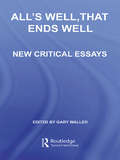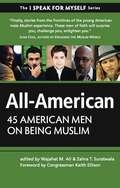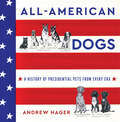- Table View
- List View
All's Well That Ends Well
by William Shakespeare'Shakespeare was not of an age, but for all time' Ben Jonson A poor doctor's daughter cures the King of France and, in return, is promised marriage to any nobleman she wishes. But the proud young count she chooses refuses to consummate the marriage and flees to Florence - after setting her a seemingly impossible task. Depicting the triumph of trickery over youthful arrogance, All's Well That Ends Well is among Shakespeare's darkest romantic comedies, yet it remains a powerful tribute to the strength of love.Used and Recommended by the National TheatreGeneral Editor Stanley WellsEdited by Barbara EverettIntroduction by Janette Dillon
All's Well That Ends Well (Family Affair #2)
by Roseanne DowellAunt Beatrice Lulu is back and creating more havoc than ever. When a body falls out of a chimney in their newly purchased cabin, she takes it upon herself to investigate. Just because her niece is Chief of Police doesn’t mean she should mind her own business. Even her husband can’t control his busy body wife. It doesn’t end there, too many things happening for Beatrice Lulu to overlook. She’s bound and determined to figure things out on her own.
All's Well That Ends Well (Folger Shakespeare Library)
by William ShakespeareThe authoritative edition of All&’s Well That Ends Well from The Folger Shakespeare Library, the trusted and widely used Shakespeare series for students and general readers.Shakespeare&’s All&’s Well That Ends Well is the story of its heroine, Helen, more so than the story of Bertram, for whose love she yearns. Helen wins Bertram as her husband despite his lack of interest and higher social standing, but she finds little happiness in the victory as he shuns, deserts, and attempts to betray her. The play suggests some sympathy for Bertram. As a ward to the French king, he must remain at court while his friends go off to war and glory. When Helen cures the King, he makes Bertram available to her. To exert any control over his life, Bertram goes to war in Italy. Helen then takes the initiative in furthering their marriage, undertaking an arduous journey and a daring trick. Few today, however, see a fairy-tale ending. This edition includes: -Freshly edited text based on the best early printed version of the play -Full explanatory notes conveniently placed on pages facing the text of the play -Scene-by-scene plot summaries -A key to the play&’s famous lines and phrases -An introduction to reading Shakespeare&’s language -An essay by a leading Shakespeare scholar providing a modern perspective on the play -Fresh images from the Folger Shakespeare Library&’s vast holdings of rare books -An annotated guide to further reading Essay by David McCandless The Folger Shakespeare Library in Washington, DC, is home to the world&’s largest collection of Shakespeare&’s printed works, and a magnet for Shakespeare scholars from around the globe. In addition to exhibitions open to the public throughout the year, the Folger offers a full calendar of performances and programs. For more information, visit Folger.edu.
All's Well That Ends Well (SparkNotes Literature Guide Series)
by SparkNotesAll's Well That Ends Well (SparkNotes Literature Guide) by William Shakespeare Making the reading experience fun! Created by Harvard students for students everywhere, SparkNotes is a new breed of study guide: smarter, better, faster. Geared to what today's students need to know, SparkNotes provides: chapter-by-chapter analysis explanations of key themes, motifs, and symbols a review quiz and essay topics Lively and accessible, these guides are perfect for late-night studying and writing papers.
All's Well That Ends Well (The New Cambridge Shakespeare)
by William Shakespeare Russell FraserAlexander Leggatt has written a new Introduction to this updated edition of Russell Fraser's text on one of Shakespeare's most ambiguous plays. Leggatt's interest in performance informs his introduction and account of the instability of the main characters. He offers a thoughtful account of the play's critical and theatrical fortunes to the end of the twentieth century, as well as of the audience experience. An updated reading list completes the edition.
All's Well That Ends Well (The Pelican Shakespeare)
by William ShakespeareThe acclaimed Pelican Shakespeare series edited by A. R. Braunmuller and Stephen Orgel The legendary Pelican Shakespeare series features authoritative and meticulously researched texts paired with scholarship by renowned Shakespeareans. Each book includes an essay on the theatrical world of Shakespeare&’s time, an introduction to the individual play, and a detailed note on the text used. Updated by general editors Stephen Orgel and A. R. Braunmuller, these easy-to-read editions incorporate over thirty years of Shakespeare scholarship undertaken since the original series, edited by Alfred Harbage, appeared between 1956 and 1967. With definitive texts and illuminating essays, the Pelican Shakespeare will remain a valued resource for students, teachers, and theater professionals for many years to come. For more than seventy years, Penguin has been the leading publisher of classic literature in the English-speaking world. With more than 1,700 titles, Penguin Classics represents a global bookshelf of the best works throughout history and across genres and disciplines. Readers trust the series to provide authoritative texts enhanced by introductions and notes by distinguished scholars and contemporary authors, as well as up-to-date translations by award-winning translators.
All's Well That Ends Well: A Comedy
by William ShakespeareHelena schemes with Diana to fulfill Bertram's stipulations and win his love, but as Bertram's infidelity and Helena's deceits are revealed, the audience is left to wonder if, in love, the end justifies the means.
All's Well That Ends Well: Love All, Trust A Few, Do Wrong To None (Dover Thrift Editions)
by William ShakespeareVirtuous maidens, vulgar soldiers, and witty fools populate this extraordinary play, a lively romp that ranges from low farce to moments of great insight. Although the play is a romantic comedy, Shakespeare offers some serious and thought-provoking dramatic fare before fulfilling the promise of the title. In the fine tradition of the Bard's plucky heroines, All's Well That Ends Well concerns Helena, the daughter of a renowned physician, and her dauntless passion for the elusive Bertram, Count of Rousillon. Risking her very life for the opportunity to choose Bertram as her husband, Helena's bid for Bertram's hand turns out to be only the beginning of a series of trials and tribulations. Finally, at the end of a comic maze of mistaken identities, betrayals, repentance, and dramatic revelations, Helena's efforts to corral her unwilling lover achieve joyful fulfillment. An ambiguous work in which mirthful entertainment is interwoven with a powerful subtext condemning class prejudice, this play possesses a singular combination of amusement and profundity that has intrigued scholars and theatergoers for four centuries.
All's Well That Ends Well: Love All, Trust A Few, Do Wrong To None (Modern Library Classics)
by William Shakespeare Jonathan Bate"A young man married is a man that's marr'd."--All's Well That Ends Well Eminent Shakespearean scholars Jonathan Bate and Eric Rasmussen provide a fresh new edition of this classic play about gender, desire, and sexual love. THIS VOLUME ALSO INCLUDES MORE THAN A HUNDRED PAGES OF EXCLUSIVE FEATURES: * an original Introduction to All's Well That Ends Well* incisive scene-by-scene synopsis and analysis with vital facts about the work* commentary on past and current productions based on interviews with leading directors, actors, and designers* photographs of key RSC productions* an overview of Shakespeare's theatrical career and chronology of his plays Ideal for students, theater professionals, and general readers, these modern and accessible editions from the Royal Shakespeare Company set a new standard in Shakespearean literature for the twenty-first century.From the Trade Paperback edition.
All's Well that Ends Swell
by Jason MilliganEvery actor knows that the secret to a successful audition is finding the perfect monologue - one that seems as if it were written exclusively for you! Mr. Milligan is our foremost author of original audition material, having already written or co-written Actors Write for Actors, Encore, Going Solo, His & Hers, Next! and Both Sides of the Story. In this, his latest volume, he has created 50 new audition pieces (25 for men and 25 for women, all various character types and situations). Each monologue comes with two possible endings - for a total of 100 variations. But Mr. Milligan goes one step further by giving you an opportunity, if you wish, to create your very own ending! He provides you with clear, concise guidelines that will help you craft your own customized conclusions! In this way, the collection provides an infinite source of possibilities for variety, spontaneity and individuality.
All's Well, That Ends Well: New Critical Essays (Shakespeare Criticism)
by Gary WallerDescribed as one of Shakespeare’s most intriguing plays, All’s Well That Ends Well has only recently begun to receive the critical attention it deserves. Noted as a crucial point of development in Shakespeare’s career, this collection of new essays reflects the growing interest in the play and presents a broad range of approaches to it, including historical, feminist, performative and psychoanalytical criticisms. In addition to fourteen essays written by leading scholars, the editor’s introduction provides a substantial overview of the play’s critical history, with a strong focus on performance analysis and the impact that this has had on its reception and reputation. Demonstrating a variety of approaches to the play and furthering recent debates, this book makes a valuable contribution to Shakespeare criticism.
All's Well: A Novel
by Mona AwadFrom the author of Bunny, which Margaret Atwood hails as &“genius,&” comes a &“wild, and exhilarating&” (Lauren Groff) novel about a theater professor who is convinced staging Shakespeare&’s most maligned play will remedy all that ails her—but at what cost?Miranda Fitch&’s life is a waking nightmare. The accident that ended her burgeoning acting career left her with excruciating chronic back pain, a failed marriage, and a deepening dependence on painkillers. And now, she&’s on the verge of losing her job as a college theater director. Determined to put on Shakespeare&’s All&’s Well That Ends Well, the play that promised and cost her everything, she faces a mutinous cast hellbent on staging Macbeth instead. Miranda sees her chance at redemption slip through her fingers. That&’s when she meets three strange benefactors who have an eerie knowledge of Miranda&’s past and a tantalizing promise for her future: one where the show goes on, her rebellious students get what&’s coming to them, and the invisible doubted pain that&’s kept her from the spotlight is made known. With prose Margaret Atwood has described as &“no punches pulled, no hilarities dodged…genius,&” Mona Awad has concocted her most potent, subversive novel yet. All&’s Well is a &“fabulous novel&” (Mary Karr) about a woman at her breaking point and a formidable, piercingly funny indictment of our collective refusal to witness and believe female pain.
All's Well: A Novel
by Mona Awad"A dazzling wild ride of a novel – daring, fresh, entertaining, and magical. Mona Awad is a powerful and poetic storyteller, telling us something new and profound here about the connection between suffering and elation. When I was away from this book, I longed to get back to it." — George Saunders, New York Times bestselling, Booker Prize-winning author of Lincoln in the Bardo "Wild and exhilarating and so fresh it takes your breath away, All's Well is an utterly delicious novel of pain and vitality, Shakespeare and the uncanny, and our own subtle moral failures when we brush up against the pain of others. Mona Awad's talent is so vital that it absolutely roars out of her. " — Lauren Groff, New York Times bestselling author of Fates and Furies "Tragic, macabre, and wicked. I laughed out loud the whole way through. One of the funniest books I&’ve read in years." — Heather O'Neill, author of The Lonely Hearts Hotel "Really funny ... The satirical targets, all brilliantly hit, include useless physios, entitled students, internet advertising and — for all you romantics out there — love!" Wendy Holden in the Daily Mail Longlisted for the 2023 Dublin Literary Award Miranda Fitch&’s life is a waking nightmare. The accident that ended her burgeoning acting career left her with excruciating, chronic back pain, a failed marriage, and a deepening dependence on painkillers. And now she&’s on the verge of losing her job as a college theater director. Determined to put on Shakespeare&’s All&’s Well That Ends Well, the play that promised, and cost, her everything, she faces a mutinous cast hellbent on staging Macbeth instead. Miranda sees her chance at redemption slip through her fingers. That&’s when she meets three strange benefactors who have an eerie knowledge of Miranda&’s past and a tantalizing promise for her future: one where the show goes on, her rebellious students get what&’s coming to them, and the invisible, doubted pain that&’s kept her from the spotlight is made known. With prose Margaret Atwood has described as &“no punches pulled, no hilarities dodged...genius,&” Mona Awad has concocted her most potent, subversive novel yet. All&’s Well is the story of a woman at her breaking point and a formidable, piercingly funny indictment of our collective refusal to witness and believe female pain.
All-American
by John R. TunisWhen a sports rivalry nearly turns deadly, Ronald Perry finds himself caught between what he knows and what he knows is right The long-standing tension between the Academy and the High School often becomes heated, especially when the two schools face each other on the football field. But when Ronald Perry, the star of the Academy team, nearly kills Meyer Goldman, a boy playing for the High School, in a dangerously hard tackle, Ronny is horrified. He swears he&’ll never play football again. Back in school, Ronny is even more shocked by the attitude of his Academy friends and teammates, who tell him not to be so hard on himself—because Goldman is Jewish. Unable to ignore the remorse he feels, Ronny decides to transfer to the High School. But when his new classmates dismiss him as a snob, he realizes that he&’ll have to work hard to break down this old rivalry.
All-American
by Keith Ellison Zahra T Suratwala Wajahat AliFollow up work to White Cloud's successful and highly acclaimed May 2011 book I Speak For Myself: American Women on Being Muslim. With this second book in the I Speak For Myself series, American Muslim men speak out on their lives and how their Muslim beliefs play out in private and on the public stage. Contributors include high profile figures in the American Muslim community, representing a new generation that is making a profound impact inside and outside the Muslim world.
All-American
by Keith Ellison Zahra T Suratwala Wajahat AliFollow up work to White Cloud's successful and highly acclaimed May 2011 book I Speak For Myself: American Women on Being Muslim. With this second book in the I Speak For Myself series, American Muslim men speak out on their lives and how their Muslim beliefs play out in private and on the public stage. Contributors include high profile figures in the American Muslim community, representing a new generation that is making a profound impact inside and outside the Muslim world.
All-American Anarchist: Joseph A. Labadie and the Labor Movement (Great Lakes Books Series)
by Carlotta R. AndersonAll-American Anarchist chronicles the life and work of Joseph A. Labadie (1850-1933), Detroit's prominent labor organizer and one of early labor's most influential activists. A dynamic participant in the major social reform movements of the Gilded Age, Labadie was a central figure in the pervasive struggle for a new social order as the American Midwest underwent rapid industrialization at the end of the nineteenth century. This engaging biography follows Labadie's colorful career from a childhood among a Pottawatomie tribe in the Michigan woods through his local and national involvement in a maze of late nineteenth-century labor and reform activities, including participation in the Socialist Labor party, Knights of Labor, Greenback movement, trades councils, typographical union, eight-hour-day campaigns, and the rise of the American Federation of Labor. Although he received almost no formal education, Labadie was a critical thinker and writer, contributing a column titled "Cranky Notions" to Benjamin Tucker's Liberty, the most important journal of American anarchism. He interacted with such influential rebels and reformers as Eugene V. Debs, Emma Goldman, Henry George, Samuel Gompers, and Terence V. Powderly, and was also a poet of both protest and sentiment, composing more than five hundred poems between 1900 and 1920. Affectionately known as Detroit's "Gentle Anarchist," Labadie's flamboyant and amiable personality counteracted his caustic writings, making him one of the city's most popular figures throughout his long life despite his dissident ideals. His individualistic anarchist philosophy was also balanced by his conventional personal life - he was married to a devout Catholic and even worked for the city's water commission to make ends meet. In writing this biography of her grandfather, Carlotta R. Anderson consulted the renowned Labadie Collection at the University of Michigan, a unique collection of protest literature which extensively documents pivotal times in American labor history and radical history. She also had available a large collection of family scrapbooks, letters, photographs, and Labadie's personal account book. Including passages from Labadie's vast writings, poems, and letters, All-American Anarchist traces America's recurring anti-anarchist and anti-radical frenzy and repression, from the 1886 Haymarket bombing backlash to the Red Scares of the twentieth century.
All-American Baby
by Sutherland PegHOPE SPRINGS Pregnant and on the run… Heiress Melina Somerset needs a new home. Hope Springs, Virginia, looks like an ideal place to make a life for herself and her unborn child. The townspeople are friendly and don't ask too many questions. She's grateful to Ash Thorndyke for getting her to Hope Springs. But his methods—and his motives—have left her wondering about his past. One thing's clear: he's not the same man she fell in love with in London. Of course, she's not exactly the woman she'd pretended to be, either. But it's time for the truth. After all, they're going to be parents now!
All-American Bean Book
by F. H. WaskeyThe All-American Bean Book offers more than 125 simple, delicious recipes for the wholesome, inexpensive and newly fashionable bean. The diversity of recipes in the The All-American Bean Book enables both vegetarians and those who enjoy meat to cook delicious meals. This is an indispensable book for cooks of all ages, for all lifestyles and for any occasion.
All-American Boy
by Larzer ZiffFrom his celebrated appearance, hatchet in hand, in Parson Mason Locke Weems's Life of Washington to Booth Tarkington's Penrod, the all-American boy was an iconic figure in American literature for well over a century. Sometimes he was a "good boy," whose dutiful behavior was intended as a model for real boys to emulate. Other times, he was a "bad boy," whose mischievous escapades could be excused either as youthful exuberance that foreshadowed adult industriousness or as deserved attacks on undemocratic pomp and pretension. But whether good or bad, the all-American boy was a product of the historical moment in which he made his appearance in print, and to trace his evolution over time is to take a fresh view of America's cultural history, which is precisely what Larzer Ziff accomplishes in All-American Boy. Ziff looks at eight classic examples of the all-American boy-young Washington, Rollo, Tom Bailey, Tom Sawyer, Ragged Dick, Peck's "bad boy," Little Lord Fauntleroy, and Penrod-as well as two notable antitheses-Huckleberry Finn and Holden Caulfield. Setting each boy in a rich cultural context, Ziff reveals how the all-American boy represented a response to his times, ranging from the newly independent nation's need for models of democratic citizenship, to the tales of rags-to-riches beloved during a century of accelerating economic competition, to the recognition of adolescence as a distinct phase of life, which created a stage on which the white, middle class "solid citizen" boy and the alienated youth both played their parts.
All-American Boy
by Scott Peck"A survivor's tale that in its universal appeal brings to mind the most compelling aspects of "Gal" and "Shot in the Heart." Through the course of these scathing, inspiring, instructive pages, Scott Peck, writer and human being, grows into one hell of a terrific man.".--Michael Dorris.
All-American Cowboy (Holiday, Texas #1)
by Dylann CrushThis city boy has it all figured out... Until he goes toe-to-toe with a fierce cowgirl who's snagged the home field advantage.Holiday, Texas is known far and wide as the most celebratory town in the South—and no shindig is complete without one of its founding members. It's a real shame the last remaining Holiday is a city slicker, but what's that old saying about putting lipstick on a pig...?Beck has no intention of being charmed by some crazy Texas town, but the minute he lays eyes on his grandfather's old honky tonk—and Charlie Walker, the beautiful cowgirl who runs it—he finds himself wishing things could be different. Life's gentler in Holiday. Slower. More real than anything he's ever known. And when he looks into Charlie's eyes, Beck may finally discover what it's like to truly belong.Holiday, Texas Series: All-American Cowboy (Book 1)Cowboy Christmas Jubilee (Book 2)
All-American Desserts: 400 Star-Spangled, Razzle-Dazzle Recipes for America's Best Loved Desserts
by Judith M. Fertig“This book is jam-packed with American heritage recipes, each one more delicious-sounding than the next!” —Gale Gand, James Beard Award–winning pastry chefThese 400 delectable recipes showcase the essence of American desserts: high-quality ingredients put together with a brash spirit of fun and adventure found only in the good ol’ USA. Whether they are traditional sweets, back-of-the-box classics, or newly inspired creations, you’ll find them all in this veritable treasure-trove of goodies.“Unarguably comprehensive . . . this book—think of it as an enhanced Betty Crocker recipe cookbook—is well worth adding to the shelf.” —Publishers Weekly“Seductive and compulsively readable . . . Fertig has compiled an exhaustive and valuable collection of American recipes and the lore behind them that will as likely end up on your bedside table as your kitchen counter.” —Regan Daley, author of In the Sweet Kitchen“A significant addition to the sweet subject of desserts, Judith Fertig’s American Desserts does not miss a step as it marches along detailing just about any dessert worth preparing and pleasurably consuming.” —Marcel Desaulniers, author of Death by Chocolate“Her readable text reflects her exhaustive research on the history of our American desserts. She delved into old ‘receipt books,’ diaries, and other primary sources, and includes hundreds of recipes for both the beloved standards . . . and lesser-known old-fashioned desserts.” —Library Journal
All-American Dogs: A History of Presidential Pets from Every Era
by Andrew HagerFrom historian-in-residence at the Presidential Pet Museum, Andrew Hager, comes a fond, fascinating, and often surprising look at the dogs who were the best friends of the presidents, featuring unforgettable photographs.President Biden’s German shepherds, Major and the late Champ, are the latest in a long line of presidential dogs. Dating all the way back to George Washington, dogs have been constant companions to nearly all of America’s presidents. Of the past 46 presidents, 31 have had at least one dog at 1600 Pennsylvania Ave.Organized by historical eras, All-American Dogs will take readers through the captivating history of the White House’s four-legged friends, the impact they had on their owner-in-chiefs, and, ultimately, American history. From the assassination of President’s Lincoln’s dog after Lincoln’s own death to President’s Hoover’s Belgian shepherd, King Tut, who helped President Hoover win the election after appearing in a campaign photo, these furry members of the first family often had a lasting impact on the administrations that kept them.As historian-in-residence at the Presidential Pet Museum, Andrew Hager will include original research and rare photographs from the National Archives to trace the history of America’s first dogs. From post-Revolutionary dogs, to Civil War era dogs, to Cold War dogs, Hager will show the differences and similarities of how our nation viewed man’s best friend.Readers will learn not only past presidents’ dogs in each historical era, but also the cultural history of dogs as pets, and the ways in which Americans’ relationships with dogs has evolved over the past two centuries.






















